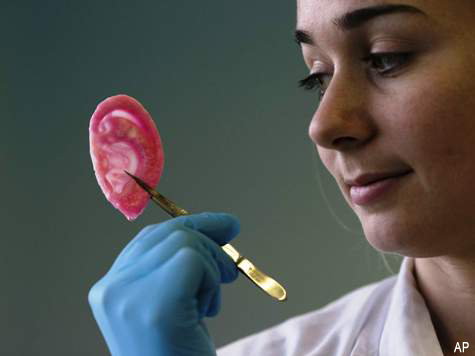Scientists in the UK are using stem cells to grow human body parts in a lab. The researchers are growing organs such as noses, ears, blood vessels and windpipes in the north London hospital where they work, in the hope that they may be used for transplants.
While only a small number of patients have received lab-grown organs so far, the scientists hope to be able to create more types of body part soon and perform the first successful transplant of a nose grown from stem cells.
The team created the nose last year for a man who lost his own to cancer. They added a salt and sugar solution to a mold of the nose, and then added stem cells from the man’s fat. The nose is currently implanted on the man’s forearm to allow skin to grow and cover it. The team are waiting for permission to transfer it onto the man’s face.
Alexander Seifalian, the scientist leading the effort, told Associated Press (AP): “It’s like making a cake. We just use a different kind of oven.”
A trial of lab-made ears is also due to start later this year. Dr Michelle Griffin said: “Ears are harder to make than noses because you have to get all the contours right and the skin is pulled tight so you see its entire structure.”
Eileen Gentleman, a stem cell scientist who is not directly involved in the research, told AP: “Scientists have to get things like noses and ears right before we can move onto something like a kidney, lungs or a liver, which is much more complicated. Where Seifalian has led is in showing us maybe we don’t need to have the absolutely perfect tissue for a (lab-made) organ to work.”
“What he has created is the correct structure and the fact that it’s good enough for his patients to have a functional (windpipe), tear duct, etc. is pretty amazing.”
Seifalian adds that while manufacturing these organs is still incredibly expensive, he hopes prices could soon come down, leading to the potential for mass production: “If people are not that fussy, we could manufacture different sizes of noses so the surgeon could choose a size and tailor it for patients before implanting it.”
“People think your nose is very individual and personal but this is something that we could mass produce like in a factory one day.”

COMMENTS
Please let us know if you're having issues with commenting.